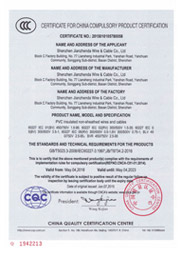 Author: Joey Wan
Author: Joey Wan  August 11,2022
August 11,2022
Under what circumstances will PVC cables cause adverse effects?
(1) The oil-immersed cable runs and leaks due to the height difference. When the oil-immersed cable is laid with a large height difference, the phenomenon of oil dripping from the cable may occur. As a result of the flow, the upper part of the cable is dried up due to the loss of oil, the thermal resistance of this part of the cable increases, and the paper insulation cokes and breaks down in advance. In addition, because the oil in the upper part runs down, it makes room at the upper cable head and creates a negative pressure, which makes the cable easy to absorb moisture and make the end wet. The lower part of the cable generates a large static pressure due to the accumulation of oil, which causes the cable head to leak oil. Wet cables and oil leaks increase the chance of failure and fire.

(2) Insulation breakdown of the intermediate joint box. The intermediate joint of the cable joint box is oxidized, heated, and glued during operation due to insufficient crimping, weak welding or improper selection of joint materials; when making the intermediate joint of the cable, the quality of the insulating agent poured into the intermediate joint box does not meet the requirements. It is required that when the insulating agent is poured, there are air holes in the box and the cable box is poorly sealed or damaged and leaks into the moisture. The above factors can cause insulation breakdown, form a short circuit, and cause the cable to explode and catch fire.
Electrical Automation Technology Network
(3) The cable head burns. Because the surface of the cable head is damp and dirty, the ceramic sleeve of the cable head is broken and the distance between the lead wires is too small, which leads to flashover and fire, causing the surface insulation of the cable head and the insulation of the lead wires to burn.
(4) External fire sources and heat sources cause cable fires. Such as the spread of fire in the oil system, the spread of the explosion and fire of the oil circuit breaker, the spontaneous combustion of pulverized coal in the boiler pulverizing system or the coal conveying system, the baking of the high-temperature steam pipeline, the chemical corrosion of acid and alkali, welding sparks and other fires, all of which can cause the cable fire.
